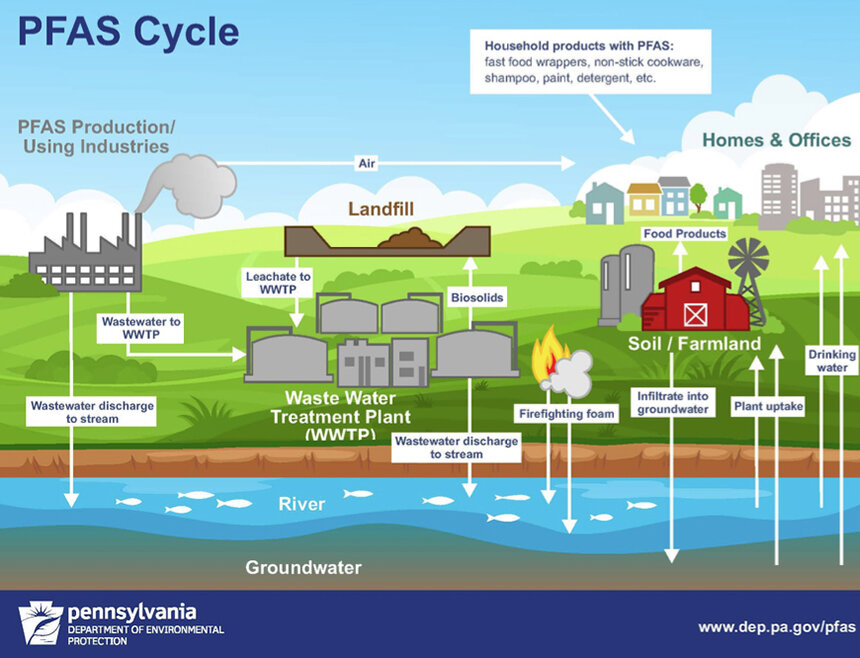Rhode Island Roads Sprayed Annually with Herbicides
May 21, 2012
Whether or not you like it, exposure to herbicides is unavoidable if you drive in Rhode Island.
Using truck-mounted hand-sprayers, portions of Rhode Island’s 1,100 miles of state roads, highways and bridges are treated with herbicides twice a year by the state Department of Transportation.
This year, the herbicide dicamba, under the commercial name Vanquish, has already been sprayed on roadsides. This synthetic herbicide was applied to road shoulders, curbs and major bridges in late April and early May to prevent the growth of weeds, brush and bamboo.
Glyphosate is sprayed in July to eliminate existing weeds and unwanted plant growth. Both are registered with state Department of Environmental Management (DEM) and legal to use.
In studies, dicamba has shown to cause liver, adrenal gland and reproductive problems in pets and other animals. It is slightly toxic to fish and other aquatic wildlife. It has a half-life of one to four weeks. Although its long-term effects are uncertain, dicamba is highly prone to leaching through soil and into groundwater. Dicamba is not classified as a human carcinogen.
The herbicide Razor, aka glyphosate, is the most common herbicide in the United States and was popularized as the main ingredient in Monsanto’s herbicide Roundup. Glyphosate poses a broader range of health risks than dicamba. Glyphosate has shown fetal abnormalities in rats, as well as estrogen and testosterone problems in human embryonic cell studies. It is a suspected endocrin disruptor. It is not considered a carcinogen.
Studies by the European Union have shown several environmental risks, including toxicity for aquatic organisms. The Environmental Protection Agency (EPA) says prolonged exposure to glyphosates in drinking water can lead to kidney and reproductive “difficulties.” It has proved toxic to crustateans and amphibians.
Weeding and mowing are alternatives to control weeds and brush. But Vanquish and Razor are inexpensive alternatives. Vanquish costs $160 for a gallon of concentrate. No more than three gallons of concentrates are needed to apply to the entire state.
Razor is even less expensive at $56 for a gallon of concentrate. Only two or three gallons are needed to create the mixture to treat all state roads.
Public herbicide use also occurs at state parks, the Statehouse grounds and other state-owned lands. Each Rhode Island city and town also relies on pesticides and herbicides to eliminate unwanted bugs and plants from public grounds.
Note: The original version of this article incorrectly stated that all state roads are treated with pesticides. Only problem areas are treated.
Categories
Join the Discussion
View CommentsRecent Comments
Leave a Reply
Related Stories
Your support keeps our reporters on the environmental beat.
Reader support is at the core of our nonprofit news model. Together, we can keep the environment in the headlines.
We use cookies to improve your experience and deliver personalized content. View Cookie Settings




Besides involuntarily exposing the public to glyphosate, DOT's use of this is also likely to result in development of a weed tolerance to glyphosate, such as is happening in the agricultural heartland. Soon, glyphosate will start becoming ineffective and DOT will need to use higher application rates or resort to even more toxic herbicides to keep the weeds at bay. Trying to outrun nature's ability to adapt to its environment through the use of toxic chemicals is a silly and ultimately fruitless endeavor. Time to develop a physical management plan for weeds!
The label for Razor (the brand of glysophate mentioned in the article) specifically says "Do not apply directly to water, to areas where surface water is present, or to intertidal areas below the mean high water mark." (http://www.cdms.net/LDat/ld6QS001.pdf). There's lots of water in RI, including in roadside ditches ("rain gardens") built specifically to contain runoff from the roads. How does DOT justify use of glyphosate on these? Are they using the glyphosate appropriately and legally? I'd like them to repond to that.
Unfortunately, thus far people have not been successful in weeding out Japanese knotweed, AKA bamboo. We at the Blackstone Parks Conservancy would love to be able to avoid treatment with chemicals. Please use your ecoRInews to encourage residents to identify and remove from their property the most common invasive plants — Japanese bittersweet, Japanese knotweed, garlic mustard and black swallow wort. I see them in yards throughout the East Side.
For example, there are infestations of black swallow wort near Blackstone Park on Paterson St. and a block of Governor where it has clearly spread from house to house. There are web sites with clear IDs and instructions for removal. Japanese knotweed can be easily removed when small and not established. Once established, it is virtually impossible to control by hand.
Anna Browder
I am shocked and dismayed! I actually was sickened once when I entered my bank branch while they were applying Roundup to the small area in front. The miserable migraine lasted for days. It is time for the Environment Council of RI and other health and environmental groups to take on this concern as a major focus!
Liberty G
"Lazy" and "hard to believe" certainly apply to this article, but not the way previous commentators intend. This article is full of, not to say wholly based upon errors, misunderstandings, and unwarranted assumptions about plants, herbicides, and state agencies' efforts to do the right thing for all concerned. Through even basic research the author would have known that only a small percentage of Rhode Island's roads are sprayed with herbicide, for instance, or that his discussion of herbicide brands and formulations was muddled and in some cases laughably wrong. There are plenty of places the author could have called to get the facts or at least a quote offering a contrary opinion. Underlying it all is the assumption that any herbicide use is worse than the environmental damage done by the target plants. Japanese knotweed, to take just one example, harms biodiversity, causes soil erosion and water quality degradation, and impairs cultural and historical landscapes that give us our sense of place (as well as our tourism industry). It also tears up pavement, costing us money that could be used for better purposes and increasing the use of asphalt and diesel. This isn't to say that there aren't areas where DOT could improve its application of herbicide. Japanese knotweed responds best to an integrated approach that includes mowing, application of multiple herbicides over a 12 to 18 month period, and detailed pedestrian follow-up. Application using backpack sprayers instead of truck mounted sprayers would use less herbicide for better results. But the article as written didn't even get that far. It did not help improve how real environmental problems are addressed and probably contributed to bad environmental management by misinforming the public and feeding polarization. EcoRI should produce a better reported series on invasive species control that would move the discussion forward productively.